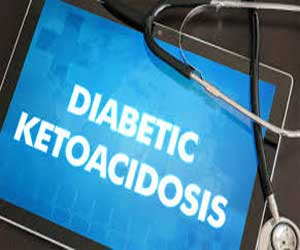- Home
- Editorial
- News
- Practice Guidelines
- Anesthesiology Guidelines
- Cancer Guidelines
- Cardiac Sciences Guidelines
- Critical Care Guidelines
- Dentistry Guidelines
- Dermatology Guidelines
- Diabetes and Endo Guidelines
- Diagnostics Guidelines
- ENT Guidelines
- Featured Practice Guidelines
- Gastroenterology Guidelines
- Geriatrics Guidelines
- Medicine Guidelines
- Nephrology Guidelines
- Neurosciences Guidelines
- Obs and Gynae Guidelines
- Ophthalmology Guidelines
- Orthopaedics Guidelines
- Paediatrics Guidelines
- Psychiatry Guidelines
- Pulmonology Guidelines
- Radiology Guidelines
- Surgery Guidelines
- Urology Guidelines
Warning-SGLT2 Inhibitors may mask ketoacidosis preoperatively, prove fatal

SGLT2 Inhibitors may mask a lethal complication of diabetes namely ketoacidosis at the time of surgery and prove fatal, finds a new study.SGLT2 inhibitors have been approved for use as a treatment for diabetes since 2013 and the most common of them are Dapagliflozin, Canagliflozin and Empagliflozin.The findings of the study have been published in the British Journal of Anaesthesia.
SGLT2 Inhibitors, a new class of diabetes medications may mask ketoacidosis at the time of surgery. The study found that 42 cases of people with diabetes who presented for various surgeries while taking SGLT2 Inhibitors(gliflozin medications), experienced ketoacidosis while their blood sugar level was normal. Therefore testing for acid load in the blood of diabetes sufferers who are taking SGLT2 Inhibitors is needed in order to avoid complications associated with ketoacidosis – a potentially lethal build-up of acid in the blood.
“Euglycaemic ketoacidosis is deceiving and likely to be missed easily as it presents with near or low-normal blood sugars,” says Dr Venkatesan Thiru, Senior Clinical Lecturer, the University of Adelaide.
“Gliflozin medications are being increasingly used to protect people against heart and kidneys diseases. They work in the kidneys to excrete excess sugar in diabetic patients’ urine.
“The condition may happen in the lead-up to surgery when patients cannot eat and drink normally.
“It is difficult to recognize euglycaemic ketoacidosis as blood sugar levels are usually normal.”
Diabetic ketoacidosis is a serious complication when the body does not have enough insulin and can’t use sugar to generate energy. Instead, the body uses fat to produce energy and this process leads to the accumulation of acids called ketones in the body. Blood sugar levels are always high with this ketone build-up which is called diabetic ketoacidosis. If this problem is not treated, it can lead to coma and death. It is likely to happen with severe infection, loss of hydration, illness or during surgery.
“Euglycaemic ketoacidosis can happen in people with both type 1 and type 2 diabetes. Unless special tests are done to assess the acid load in the body, clinicians can miss this complication. The symptoms are similar to other events during and after surgery such as mild acid build-up, vomiting, and abdominal pain,” says Dr Thiru.
“Failure to identify and treat this condition can result in unnecessary tests looking for other medical and surgical problems after surgery.
“In the 42 cases identified in the study, euglycaemic ketoacidosis occurred within a few hours after surgery and up to a few weeks after their operation. Changes in patients’ diabetes medications, diet and illnesses were found to be responsible.
“Patients who undertake weight reduction surgery when they are on a special diet program are at an increased risk of experiencing this complication.
“Extra vigilance is the key to reduce this complication and patients should be educated about this. Caregivers should ask for acid load to be tested by checking for blood ketone levels. The good news is that some of the latest blood glucose home monitoring kits can also test for acid build-up.
“While the rate of this incident occurring in diabetic patients having surgery is unknown at this stage, our team is embarking on a study to assess the ongoing risk,” says Dr Thiru.

Disclaimer: This site is primarily intended for healthcare professionals. Any content/information on this website does not replace the advice of medical and/or health professionals and should not be construed as medical/diagnostic advice/endorsement or prescription. Use of this site is subject to our terms of use, privacy policy, advertisement policy. © 2020 Minerva Medical Treatment Pvt Ltd